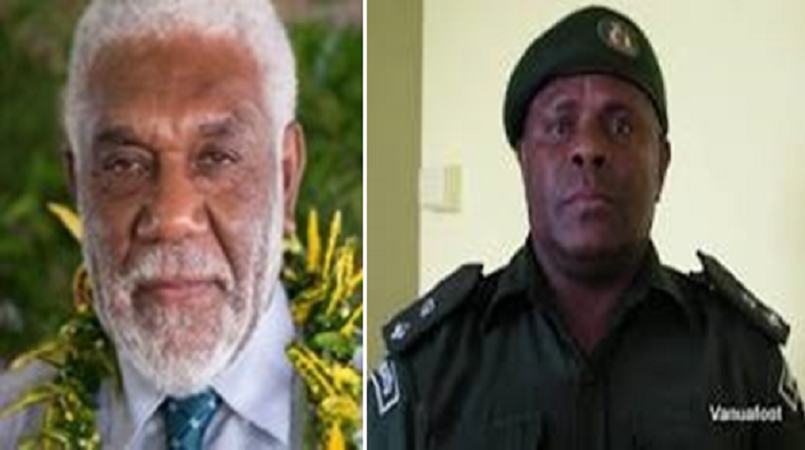
A Vanuatu Supreme court decision on the fate of deputy prime minister, Joe Natuman and former acting police commissioner, Aru Maralau, has found that the prosecution may have laid charges under the wrong subsection of the Penal Code.
Mr Natuman and Mr Maralau are facing charges of conspiracy to defeat the course of justice,
Justice Chetwynd made the ruling after hearing a submission on a point of law on 18 April 2016, as requested by the Chief Magistrate Felix Steven. The request was for the Supreme Court to determine if there are elements necessary to convict Mr Natuman and Mr Maralau under subsection 79 (c) of the Penal Code or if they did obstruct or in any way interfere with or knowingly prevent the execution of any legal process civil or criminal.
The Supreme Court judge said: “There appears to have been some confusion in the way the case was argued before the Learned Chief Magistrate because although the prosecution has proceeded under section 79 (c) they appear to have argued their case as if it were a charge under 79 (a) or preventing process before the court”.
“These are not conspiracy to pervert the course of justice charges. At the groove in the record, both defendants are charged under section 79 (c)”, he said.
He made the remarks after clarifying that section 79 (a), (b) and (c) of the Penal Code have separate meanings and separate offences, and that only subsections (a) and (b) refer to obstruction in relation to “the course of justice”. “Subsection (c) refers to obstruction of, or interference with something entirely different”, he said.
Justice Chetwynd continued “what the prosecution must prove is that Mr Natuman did something which made more difficult the execution of a legal process or, which to his knowledge interfered with the execution of legal processes”. But in this case, the charges made it seemed like they have interfered in a course of justice or a court process.
In relation to Mr Maralau, Justice Chetwynd said it must be proved that he was complicit, (that is he aided, counseled, or procured Mr Natuman) in his (Natuman’s) obstruction of, or knowing interference with the execution of legal process.
To make it clearer, Justice Chetwynd said “it must be borne in mind that legal process is not the same as the course of justice. He said the prosecution must establish that the defendants had an intention to obstruct or interred with the execution of a legal process”.
“If it is established that the defendants intention was something more than mere intention for example, “something in nature of criminal intend” then their motives for doing what they did is irrelevant”, he ruled.
In addition to making a decision on the point of law raised by the Chief Magistrate, Supreme Court Justice Chetwynd said after reading the submissions of the prosecution, he cannot think that there has been a misunderstanding of the mischief that section 79 (c ) is aimed at.
He also raised concern that none of the parties thought to look at the provisions of section 6 of the Vanuatu Police Act which deals with the general powers of the police commissioner and how he (Police Commissioner) takes direction from the minister of police.
This ruling of Justice Chetwynd, as requested by the Magistrate Court, in line with the Judicial Services and Courts Act, is crucial as it will assist the learned Chief Magistrate Felix Steven, to make a ruling on whether or not Mr Natuman and Mr Maralau did have a case to answer. The Magistrate court is yet to set a date to which it will hand down its decision that will end the preliminary stage of the conspiracy allegations levelled against Mr Natuman and Mr Maralau.
Pic: Joe Natuman (L) and Aru Maralau (R)
